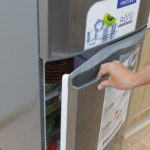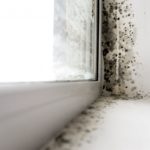Leaving the refrigerator door open can cause the cold air inside to escape, affecting the freshness and longevity of your food and allowing insects to enter. However, it’s easy to accidentally leave the door open or not close it properly, leading to several consequences. Explore the seven adverse effects of an open or poorly closed refrigerator door below.
1 Adverse Effects of Leaving the Refrigerator Door Open
Food Spoilage
When cold air escapes and the temperature inside the refrigerator drops, it can no longer effectively preserve your food. Your food is susceptible to spoilage, developing an unpleasant odor and becoming unfit for consumption. Moreover, the odor can permeate the inner walls of the refrigerator, making it challenging to eliminate the smell over time.
 Food spoilage
Food spoilage
Increased Energy Consumption
Frequently leaving the refrigerator door open or failing to close it properly leads to unnecessary energy consumption. The refrigerator will continue to operate until it reaches the desired temperature to protect its block and conserve energy.
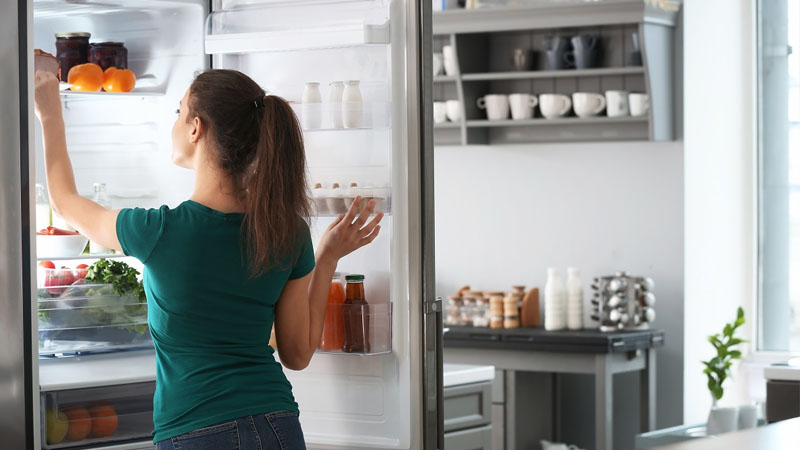 Increased energy consumption
Increased energy consumption
When the door is not properly closed or left ajar, cold air escapes, causing the temperature inside the refrigerator to drop. As a result, the refrigerator has to work continuously, demanding higher energy consumption until you close the door.
Water Leaks from the Refrigerator
When the refrigerator door is not properly sealed, the interior does not maintain the necessary temperature, causing the ice built up on the walls to melt and leak onto the floor or other parts of the refrigerator. This not only creates a mess but also accelerates the wear and tear of its components, leading to reduced cooling efficiency.
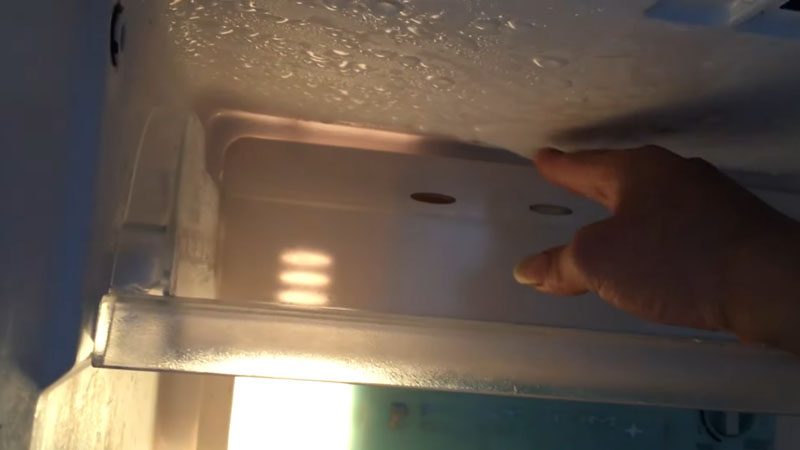 Water leaks from the refrigerator
Water leaks from the refrigerator
Refrigerator Stops Cooling
It is understandable that the refrigerator stops cooling when there is a prolonged escape of cold air. Moreover, as the engine works continuously to maintain the temperature, the components experience accelerated wear and tear, leading to potential refrigerator malfunction.
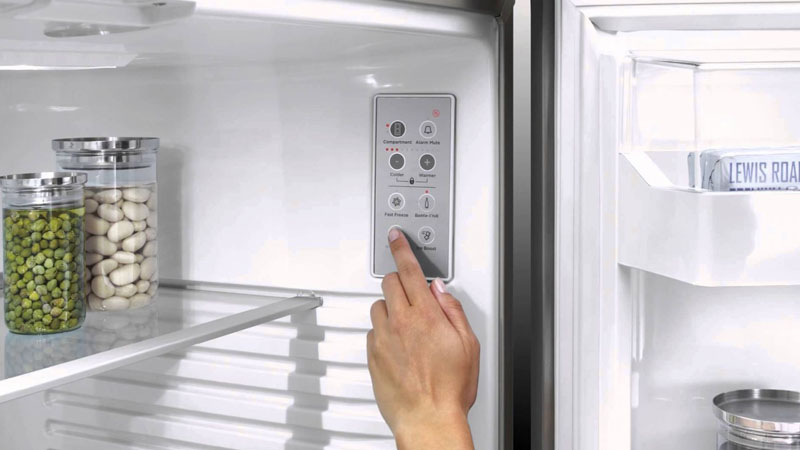 Refrigerator stops cooling
Refrigerator stops cooling
If you notice that ice is not forming in the freezer compartment even after 3-4 hours, it indicates that your refrigerator may be malfunctioning and requires repair.
Refrigerator Keeps Turning Off
As mentioned earlier, the refrigerator will stop operating once it reaches the desired temperature to cool the interior. It will only turn back on when the temperature drops significantly. However, if you notice that the refrigerator keeps turning off, it could indicate a malfunction in the heating element.
 Refrigerator keeps turning off
Refrigerator keeps turning off
The continuous turning off of the refrigerator compromises the optimal temperature for food preservation, wastes energy, and reduces the appliance’s lifespan.
Loud Noises from the Refrigerator
The loud noises can be attributed to the refrigerator’s attempt to maintain the desired temperature, causing frost to build up on the evaporator coils. The internal fan may hit the frost buildup, creating a loud noise. Additionally, an overloaded compressor can also emit loud noises, indicating a potential malfunction.
 Loud noises from the refrigerator
Loud noises from the refrigerator
Refrigerator Stops Working
This is the most severe consequence of failing to close the refrigerator door properly. Over time, the appliance’s components may malfunction and cause the refrigerator to stop working altogether due to continuous operation beyond its capacity.
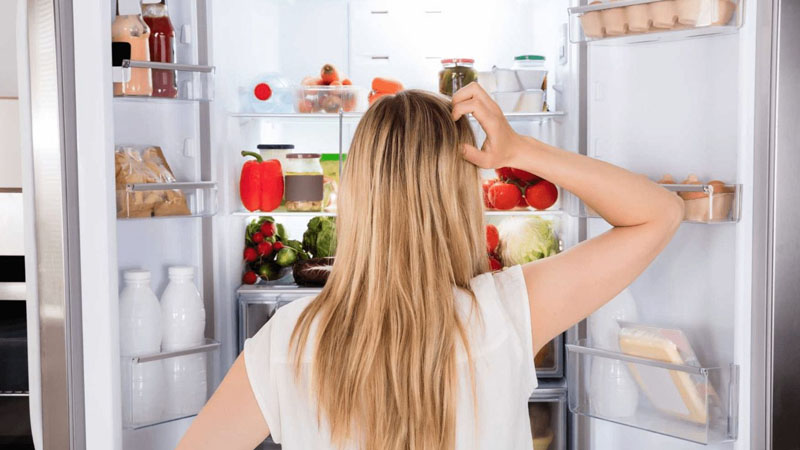 Refrigerator stops working
Refrigerator stops working
2 Tips for Using Your Refrigerator
Regular Cleaning: Maintain a clean refrigerator by cleaning it regularly (every 2-3 weeks) to ensure its longevity and the safety of the food stored inside. Remove expired or soon-to-be-expired food items to keep the refrigerator organized and prevent overloading.
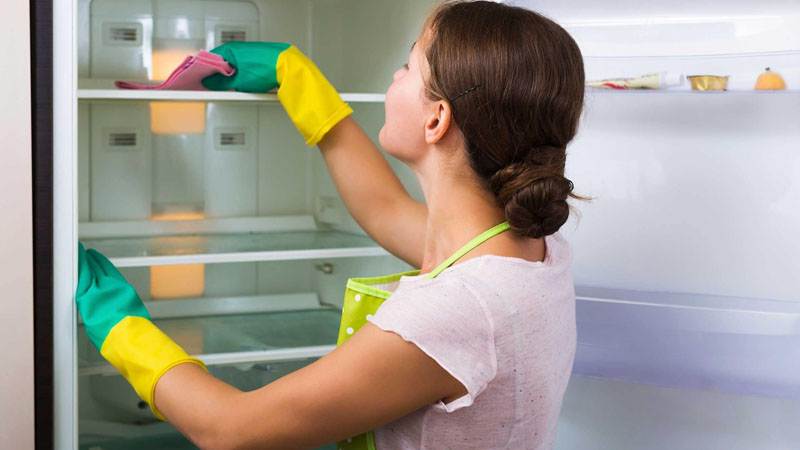 Regular cleaning
Regular cleaning
Check the Door Seal: After removing food items, remember to check if the door is properly sealed. Press the door firmly and ensure that no cold air is escaping.
Clean the Door Gasket: Food residue on the door gasket can cause oxidation over time, affecting its adhesion. As a result, you may need to press the door harder to create a proper seal.
Avoid Overloading the Door: Only place lightweight items (, , …) and ready-to-eat meals on the door to prevent overloading, sagging, or misalignment, ensuring the door can be closed tightly.
 Avoid overloading the door
Avoid overloading the door
These are the adverse effects of leaving your refrigerator door open or not closing it properly. Hopefully, you now know how to better care for and maintain your refrigerator for the long term.
Warning: 7 Potential Risks of Not Shutting Your Fridge Door that Can Result in Energy Loss
Do you ever forget to close your refrigerator door fully? If so, you should consider the consequences of this careless action. Read on to find out the potential problems that could arise when the refrigerator door isn’t shut securely, such as energy waste, a decrease in food freshness, and potential pest invasions. Learn why it’s essential to make sure your fridge door always stays tightly shut!
8 Signs You Should Know That Your Refrigerator is Malfunctioning
If you’ve been using a refrigerator for a while, you may start noticing certain signs that something’s not quite right. Be aware of any frost build-up, loud noises, or lack of cooling – these could all be indications of a broken fridge. Take preventative measures quickly to avoid more serious consequences down the line. Learn more about the tell-tale signs of a faulty refrigerator below.
























